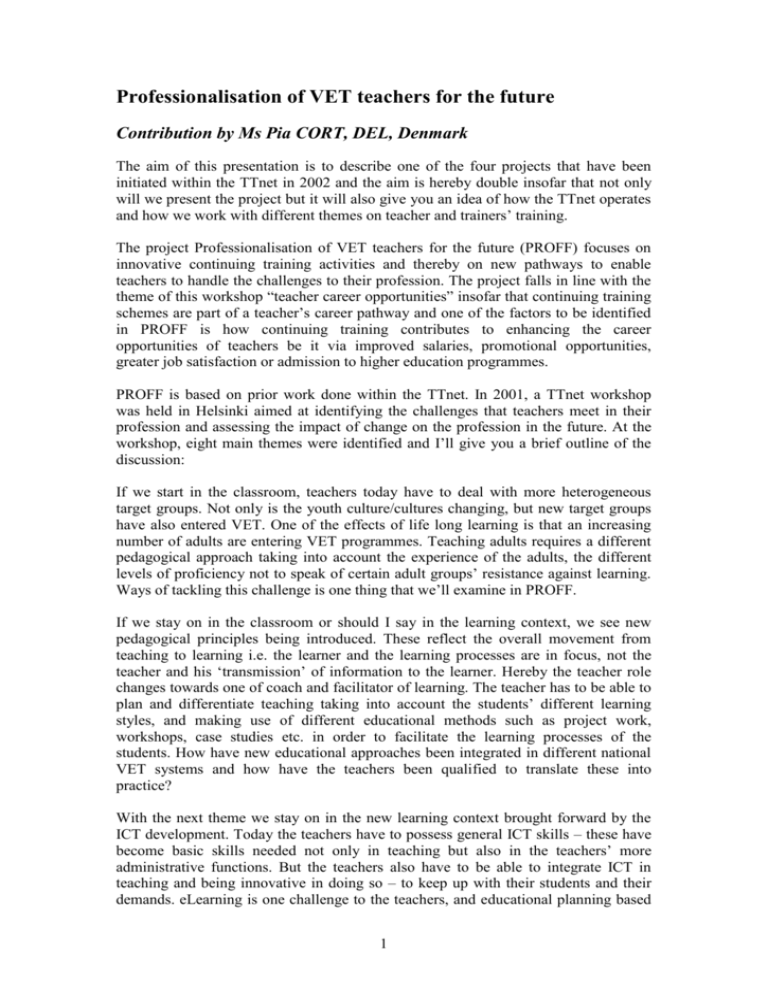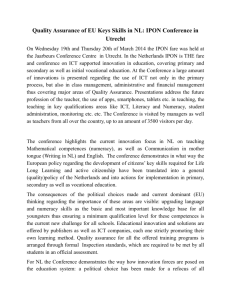Professionalisation of VET teachers for the future
advertisement

Professionalisation of VET teachers for the future Contribution by Ms Pia CORT, DEL, Denmark The aim of this presentation is to describe one of the four projects that have been initiated within the TTnet in 2002 and the aim is hereby double insofar that not only will we present the project but it will also give you an idea of how the TTnet operates and how we work with different themes on teacher and trainers’ training. The project Professionalisation of VET teachers for the future (PROFF) focuses on innovative continuing training activities and thereby on new pathways to enable teachers to handle the challenges to their profession. The project falls in line with the theme of this workshop “teacher career opportunities” insofar that continuing training schemes are part of a teacher’s career pathway and one of the factors to be identified in PROFF is how continuing training contributes to enhancing the career opportunities of teachers be it via improved salaries, promotional opportunities, greater job satisfaction or admission to higher education programmes. PROFF is based on prior work done within the TTnet. In 2001, a TTnet workshop was held in Helsinki aimed at identifying the challenges that teachers meet in their profession and assessing the impact of change on the profession in the future. At the workshop, eight main themes were identified and I’ll give you a brief outline of the discussion: If we start in the classroom, teachers today have to deal with more heterogeneous target groups. Not only is the youth culture/cultures changing, but new target groups have also entered VET. One of the effects of life long learning is that an increasing number of adults are entering VET programmes. Teaching adults requires a different pedagogical approach taking into account the experience of the adults, the different levels of proficiency not to speak of certain adult groups’ resistance against learning. Ways of tackling this challenge is one thing that we’ll examine in PROFF. If we stay on in the classroom or should I say in the learning context, we see new pedagogical principles being introduced. These reflect the overall movement from teaching to learning i.e. the learner and the learning processes are in focus, not the teacher and his ‘transmission’ of information to the learner. Hereby the teacher role changes towards one of coach and facilitator of learning. The teacher has to be able to plan and differentiate teaching taking into account the students’ different learning styles, and making use of different educational methods such as project work, workshops, case studies etc. in order to facilitate the learning processes of the students. How have new educational approaches been integrated in different national VET systems and how have the teachers been qualified to translate these into practice? With the next theme we stay on in the new learning context brought forward by the ICT development. Today the teachers have to possess general ICT skills – these have become basic skills needed not only in teaching but also in the teachers’ more administrative functions. But the teachers also have to be able to integrate ICT in teaching and being innovative in doing so – to keep up with their students and their demands. eLearning is one challenge to the teachers, and educational planning based 1 on blended models mixing eLearning with class room teaching, group work, seminars etc. is another. What kind of schemes exists qualifying the teachers for both the ‘hardware’ and the ‘software’ side of ICT? From the classroom, we move onto the organisation and the demand for school development stemming from a more competitive market for education programmes and from new ways of organising and structuring VET programmes. Today the vocational schools have to develop into learning organisations, the most important resources of the schools are the teachers and their knowledge and hereby competence development and knowledge sharing become central issues for school management and in the formulation of strategies. The new ways of organising VET programmes – and here I think of flexibility, modularisation and interdisciplinary teaching challenge the role of the VET teachers, they are no longer isolated, autonomous teachers but have to work in teams in order to plan, co-ordinate and carry out teaching together. How are the teachers qualified to meet this challenge and change the traditional role of the teacher? This is a point where we already now have some interesting cases! The next step is onto the labour market and the new skills demands. The business community, which the colleges serve, want young people to leave the colleges with immediately useful skills. But if the vocational skills of the teachers are not continuously updated and kept in line with the technological development within the trades, this will entirely depend on the practical training and the interaction between school-based and work-based training (which at least is one of the main principle in the Danish VET system) will be weak. So a central question in PROFF is how the vocational skills of the teachers are kept up-to-date with the development within the trades/trade sectors. Another aspect of the challenges stemming from the labour market development is how to attract suitable candidates for the teacher profession in a period where the cohort of young people is declining and many teachers are retiring. The teacher profession is central in a so-called knowledge society – and if the ideal of life long learning is to be attained professional teachers are a prerequisite. The government and the professional organisations play a vital role in this question, and a national strategy for attracting and retaining teachers within the profession may have been formulated in some countries. This is also an area of great interest within the project. From the government stems a number of challenges to the VET teacher profession: new national legislation on VET, major reforms and changing political priorities. The VET teachers are part of a political system and have to be able to handle changing political priorities. The VET system is no longer a stable system – remaining the same for decades. Reform follows reform, and the teachers have to be able and prepared to handle rolling reform. How is this done? Going from the national level to the international. There are several aspects to be considered, the effect of the European Union and the co-operation within the field of VET in the form of joint declarations and action programmes is one side. Adding an international dimension to the teaching is another. The latter requires language skills, knowledge of other countries, knowledge of trades and trade requirements in other countries, intercultural communicative skills, etc. The action programmes under the 2 EU Commission are obviously one of the ways to add this dimension directly within the classroom, but what other schemes exist promoting internationalisation of VET teacher skills? Finally, we go to the source itself – the teachers. The teachers have an interest in raising professional standards and thereby improve their position on the labour market. They may require that the schools work more professionally with competence development and that non-formal competences are recognised and made part of a more transparent salary and career system. This was an outline of some of the challenges to the VET teacher profession identified at the Helsinki workshop. The overall conclusion of the workshop was that ‘it is fairly easy to identify transnational challenges in the ‘professionalisation of teachers’. However, in order to find solutions and identify good practices to meet these challenges, more dialogue and research are needed’. The PROFF project takes its point of departure in this conclusion and aims precisely at ‘identifying examples of ‘good practice’ in the efforts to meet the challenges to the VET teacher profession within the Member States’. The project is carried out by TTnet Finland and Denmark with TTnet Italy, Holland, Norway and Portugal as partners. From each country four to five cases are collected providing examples of innovative CVET measures initiated to meet these challenges. On this basis we will hopefully be able to identify transnational trends and point to priority areas in the efforts to professionalise the VET teacher profession and thereby enhance its overall esteem. The project was started up in August 2002 and at present we have collected 20 case studies describing measures in all countries represented. November 2002 3







